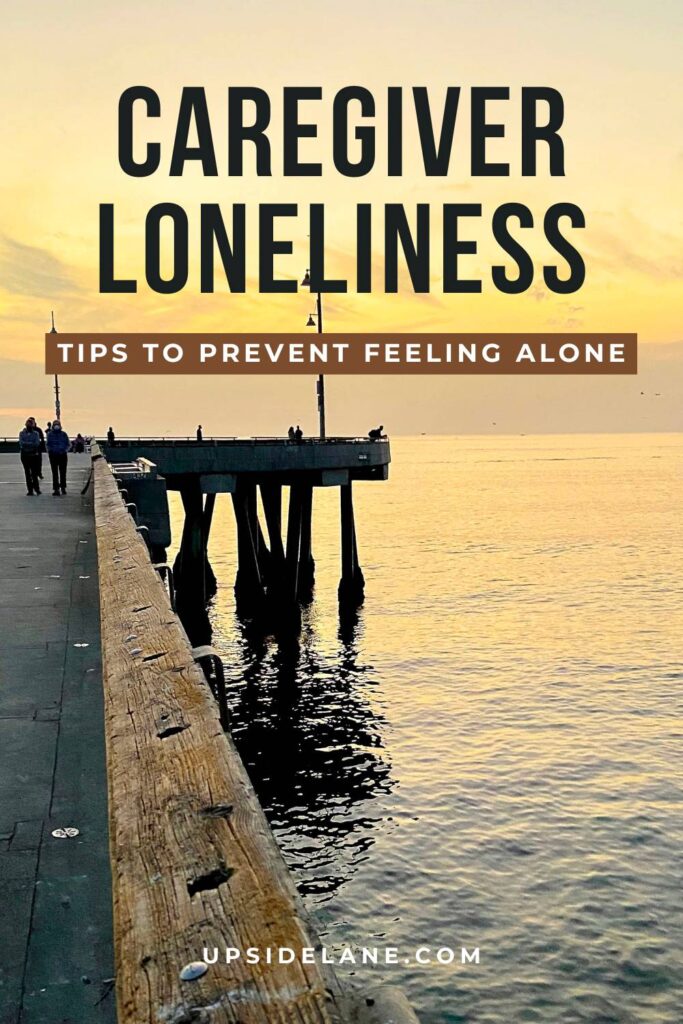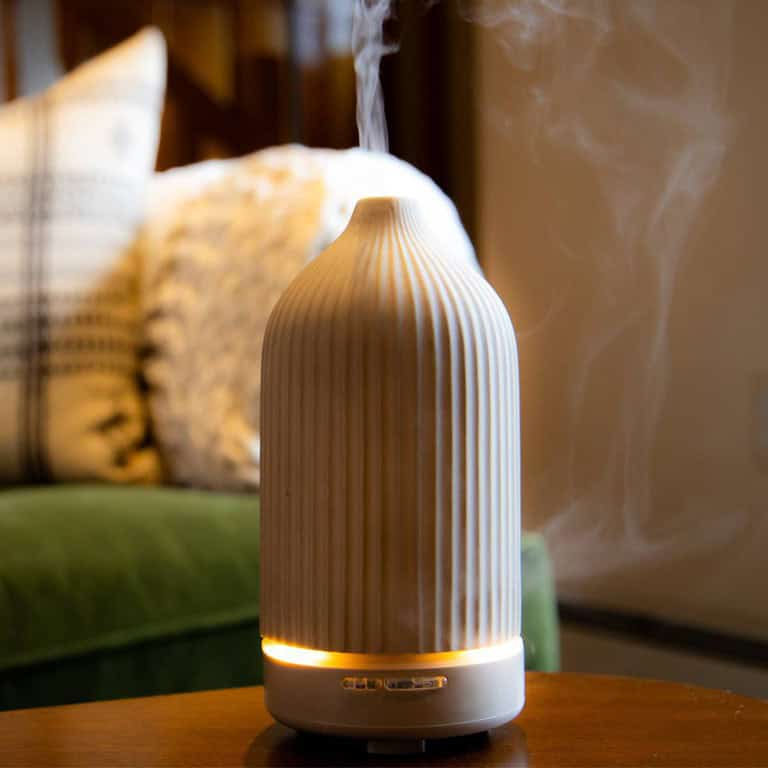Caregiver Loneliness: Tips to Prevent Feeling Alone
Caregivers often face the unexpected dichotomy of feeling alone while caring for others. Let’s look at tips to prevent caregiver loneliness and isolation.

NOTE: This post has been updated since it was originally published on March 30, 2022.
I strongly believe being a caregiver and taking care of those in need is an honor. However, taking care of a loved one, when it seems the whole world is passing us by, can lead to feeling alone and isolated.
As a caregiver, feeling alone occasionally is normal. There are many lonely people in this world without them being caregivers, so just knowing that can help, and it can be your first step toward crushing loneliness.
Before moving to Cape Cod, I lived in Los Angeles. It was where I danced professionally and became a nurse, and it was where I cemented my desire to live a healthy lifestyle for overall health and longevity.
Most important California was where I raised my three children.
So when I moved to Cape Cod to be closer to Doug’s family, I definitely had bouts of feeling lonely. I basically left my entire support system in California!
But I also love adventure, new challenges, and learning and building new things, and I really wanted to get Doug back to his home and roots.
I wasn’t in denial about Doug’s Parkinson’s disease and how it would progress. I knew I had to work very hard at rebuilding my own support system here on the Cape, and it is something I continue to work on today.
As caregivers, it is a good habit to consistently build and strengthen the support we have all around us.
This article may contain affiliate links for your convenience. If you make a purchase, I receive a small commission at no extra cost to you. Thank you for your support. You can read my full disclosure policy here.
Caregiver Loneliness versus Social Isolation
Feeling lonely and being socially isolated are two different things.
They can be related but do not always go hand in hand. It’s important to be clear about where you stand in terms of loneliness versus social isolation.
According to the National Institute on Aging, feeling lonely is feeling distressed because you are alone or separated.
Whereas social isolation is having few people to interact with regularly.
A person can be alone but not feel lonely, meaning they aren’t particularly distressed or sad about being alone.
And one can be alone but not necessarily feel socially isolated. The experience of loneliness and social isolation do not have to go together.

Caregiver Check-In: 3 Questions When You’re Feeling Alone
- Can you determine if you feel lonely, socially isolated, or both?
- If lonely, can you determine if it is because you feel socially isolated or perhaps for a different reason? Are you missing engaging with friends and family members, or do you feel like no one understands?
- If you are socially isolated, does this make you feel lonely, or perhaps a different feeling? Are you feeling angry, sad, frustrated?
Feelings are complicated and it is sometimes challenging to parse out exactly how you feel. That is okay. It is good to continue asking questions and to try not to judge or be too hard on yourself.
5 Tips To Prevent Caregiver Loneliness and Feeling Alone
Let’s look at ways to combat loneliness. Here are 5 tips on how to prevent feelings of loneliness – plus 2 bonus tips.
1. Physical activity. Physical activity is one of the most important things you can do to combat all kinds of mental/emotional issues as a caregiver.
Moving your body changes your brain chemistry in minutes. It provides you with that ‘feel good’ feeling almost instantly.
The physical activity you do does not have to be strenuous. Pick some sort of movement activity you like, such as walking, biking, yoga, or gardening. Any movement you enjoy is perfect.
Your physical activity also does not have to be for hours on end. The Department of Health and Human Services recommends at least 150 minutes of moderate aerobic activity, or 75 minutes of more vigorous aerobic activity, each week.
You can break this up any way that suits your lifestyle; 30 minutes per day for 5 days, 60 minutes for 2 days, or break it up even further into 10-minute increments throughout your week.
The point is, anything is better than nothing, so just move, move, MOVE! It is great for your mental, emotional, and physical health.

2. Healthy whole food. No doubt eating whole, real food, versus eating fatty, sugary, highly processed junk food, is a great way to boost mood and feelings of well-being.
Eating highly processed foods causes inflammation within the body, which can adversely affect our emotions and mood.
There is a two-way communication system between the gut and the brain. We now know there are just as many chemical receptors in the gut, if not more, than in the brain. and they help to regulate mood and emotions.
So it makes sense if we feed our body junk food, we are going to have junky moods such as depression and anxiety. These mood changes can thus exacerbate feelings of loneliness.
Eating a healthy, whole-food diet, and avoiding processed, sugary, junk food can be protective against depression and other mood disorders.
So eat up but make it healthy, whole, real food!
A simple guide: If it grew in the ground, or on a tree, it’s a whole food. If it was grown in a chemical plant or food factory, then it most definitely is not a whole food.
3. Hobbies. Think about starting a hobby, or restarting one you once enjoyed. Even better if you do that hobby with a friend who has similar interests. Join a hobby or book club.
For caregivers who cannot easily leave the home, there are really good online clubs and classes you can join these days, with those who have common interests.
One good thing that came out of the pandemic was the increase in virtual learning, so I encourage you to take advantage of online classes and clubs.
4. Schedule a chat. Spending time with close friends and family is crucial for caregivers. It is a great way to combat chronic loneliness and connect with new friends through social interaction.
If you cannot meet up with a friend group in a social environment, like a coffee shop or bookstore, consider scheduling a consistent time to talk weekly over the phone, or online.
This scheduled time could be as simple as a telephone call, or if you want to see each other live, then you could schedule a virtual call like on FaceTime or Zoom.
You could even schedule a virtual gathering to chat, have a cup of coffee, and do a hobby or craft together.
Now that would be the best of both worlds – social interaction with good friends and meaningful connections, all the while doing a hobby together.
Social groups online are becoming increasingly popular and, although they cannot take the place of in-person meet-ups, for homebound caregivers, these types of social settings can be extremely helpful, and a healthy way to meet new people and make new connections.
5. Join a faith-based community. For me, joining a community where I can deepen my spirituality, engage with like-minded people, and participate in charitable events has been a game-changer.
The COVID pandemic brought many faith-based communities together online, so if it is difficult to leave the home due to caregiving responsibilities, do not let that deter you.
I know both of my church organizations, here on the Cape and back in California, started building their online community when the pandemic hit.

Bonus Tips: Caregiver Loneliness Prevention
- BONUS TIP 1: Adopt a pet. This may be a total indulgence but the truth is animals can be an incredible comfort for some, and helpful if you are feeling lonely. I’d love a few more doggies in my home but, for me, it is not realistic. Perhaps it may be for you!
- BONUS TIP 2: Upside Lane Community. Join the Upside Lane Community for support from other caregivers who understand your situation. This community was built for exactly people like us, caregivers who occasionally experience loneliness and social isolation from time to time.
My commitment is to build social connections, and a strong community, and to help support caregivers around the world. I would love for you to be a part of it.
Homebound Caregivers
I know for some caregivers, at this stage of their journey, leaving the house may not be feasible out of fear of jeopardizing their loved one’s safety.
Please know that you are giving your loved one the most precious gift imaginable, your selfless loving support. You are also receiving a gift, the gift of time with your loved one.
That said, there are definitely ways to stay active within the home. Here are a few ideas:
Staying Active As A Homebound Caregiver
Stairs. If you have stairs, go up and down your steps in 5-10 minute bursts.
Weights. Buy some hand-held weights to do 10-minute weight sessions.
NOTE: These can be found used or second-hand pretty readily, so I’d look there first.
Online. Depending on what interests you, YouTube has all sorts of free workout classes. Throughout the pandemic, I did yoga classes at home, and online through YouTube, and I found it was very helpful and fun!
Cardio. Getting your heart rate up every day helps to boost endorphins and mood. You can use a simple jump rope, a mini-trampoline, or something more extravagant, depending on your budget.
If you can, I’d strongly consider buying a piece of cardio equipment for your home. I know they can be pricey but I don’t think you would be disappointed in the long run.
When I lived in California, I owned a recumbent bicycle that I used all the time. That bike must have been over 20 years old when I gave it away, but it was still working just fine.
Now I own a treadmill, and I love it. I use my treadmill when the days here on the Cape are cold and rainy.
NOTE: This too is a great item to buy used. Many people tire of their workout equipment way before it breaks down, and they want to upgrade to something ‘new and better.’ That is the best time to get a good deal!
Professional Help if Needed
Sometimes it can be challenging to get a handle on our emotional health, and feeling alone can lead to bigger, more serious, mental health conditions like depression and anxiety.
It is important to seek a qualified health provider to help you with these difficult and uncomfortable feelings.
Mental health professionals are trained in this area, and by reaching out for support for any negative feelings you may be having, you are taking your health into your own hands and being your own best friend!
Feeling Alone and the Loneliness Epidemic
There is a loneliness epidemic in the United States, with a recent study showing about one in two adults experiencing loneliness.
The exponential growth of technology has been a blessing and a curse. Broadening communities and helping those who cannot readily be out and about in society.
However, the time spent on devices, social media, video games, and more, distracts us from being out in society and deeply connecting with others.
While technology is a transformative platform that has undeniably played a part in developing new modes of connection, we must also use it wisely.
There is room for both, and by striking a balance we can take advantage of technology benefits while also maintaining human friendships that make us feel truly seen, heard, and special.
Let’s Connect
I hope you find these tips to prevent feeling alone helpful, and that you can put them to use in your life as a caregiver.
Caregiving can be both challenging and deeply rewarding. It requires selflessness and resilience but also presents moments of connection and love.
As caregivers, we may continue to give and offer all that we can but it is also important that we nurture ourselves – in mind, body, and spirit.
By caring for ourselves, we ensure we can continue offering the best care for others.
QUESTION. As a caregiver, when are the times you feel most isolated and alone? When do you feel lonely?
Not easy questions but I’d love to hear from you. Please share your thoughts in the comments section below.
Additional Caregiver Articles to Enjoy
- 10 Best Caring Inspirational Quotes For Caregivers
- The Mental Health Benefits of Crocheting
- Caregiver Burnout: Caring For Yourself Under Stress
- Infrared Sauna Benefits: Using My Sauna At Home







Dawn, this is such a great post. I have a friend who went through this with her father, and it was heartbreaking. I am sorry you and your family are going through this ordeal. I will keep you and your family in my prayers.
Thank you Dusty. I am sorry to hear about your friend. We will always try make lemonade out of lemons. 😉